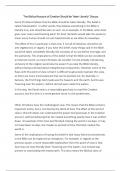‘The Biblical Account of Crea on Should be Taken Literally’ Discuss
Some Chris ans believe that the Bible should be taken literally. This belief is
called 'literalisa on'. In other words, they believe everything in the Bible is
literally true, and should be seen as such. As an example, in the Bible, when God
gives man 'every seed-bearing plant' for food, literalists would take this quote to
mean every human should not eat meat/animals as we o en do nowadays.
The effect of this in par cular is that a lot, if not all of literalists, should be (or
are) vegetarians or vegans. If you have this belief, many things said in the Bible
would be taken completely literally, like concepts of no sex before marriage, and
the patriarchy. This implica ons of this belief is that the Bible can be considered
a historical record, as many Chris ans do consider it to be already. Introducing
someone to the religion would also be easier if you take the Bible literally,
without being confused about metaphorical components. However, some of the
flaws with this point of view is that it is difficult to genuinely maintain this view,
as there are many inconsistencies that can be pointed out, for example, in
Genesis, the first things God made was the heavens and the earth, but He was
'hovering over the waters', before He had even create the waters.
In this way, the literal view is a reasonably good way to read the Crea on
account, but this view in a more general sense is a bit problema c.
Other Chris ans have the mythological view. This means that the Bible contains
important truths, but is not directly the Word of God. The effect of this kind of
view is that Chris ans can understand the power God possesses in the Crea on
account, without believing that He created everything exactly how it was wri en
down. An example of this how God finished making the world in six days - it may
not have been six days, but maybe six periods of me that God created the
world in.
Some of the implica ons of having this belief is that many literal inconsistencies
in the Bible can be explained as metaphors. For example, in regards to the
previous quote, a more reasonable explana on from this point of view is that
God may not have literally been 'hovering over the waters', but instead was
present or overlooking the empty earth. This also means the Biblical story of
, Crea on and the scien fic explana on for crea on can coexist in most
instances. However, the Bible cannot be used effec vely as a source of teaching,
because the points inside are considered much more personal and the
meanings subjec ve to the reader.
Despite this, the mythical view is a good way to read the Crea on account,
because it allowed the reader to become closer with God and understand Him
more as the all-powerful being that He is said to be. Understanding God more
also makes Him more personal to the reader.
In conclusion, the Biblical account of Crea on should not be taken literally.
While this is what many new Chris ans are encouraged to do, there are
inconsistencies that cannot be explained when keeping the literalist viewpoint,
which may lead to literalists ques oning the Crea on story, and ul mately God's
Power.




